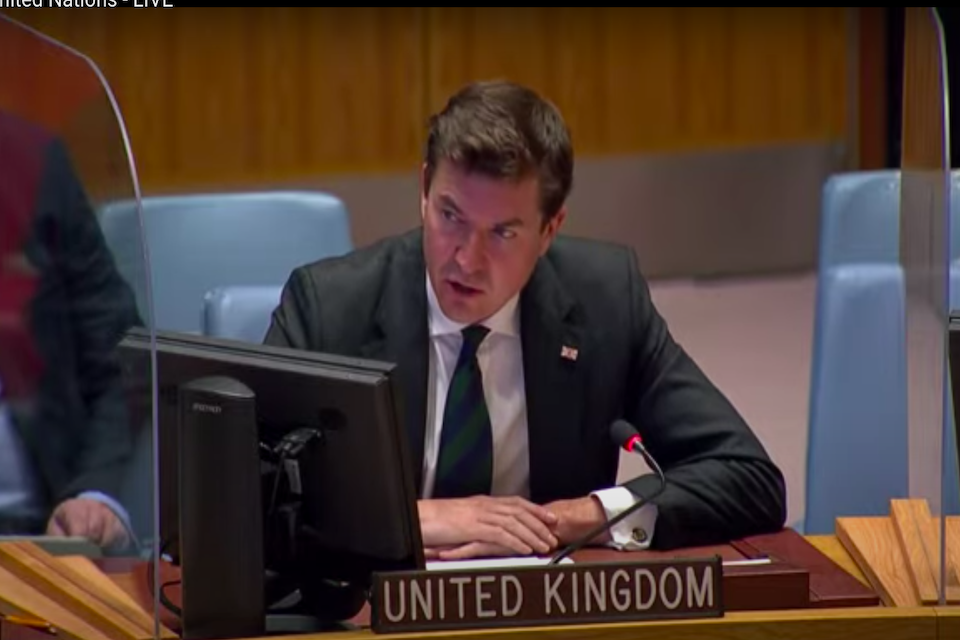No sustainable peace in the Sahel without protection of human rights
Statement by Ambassador James Roscoe at the Security Council briefing on the Sahel.

Thank you Mr President and thank you to USG Lacroix and Ms. Sinaré for their briefings and of course to the Permanent Representative of Chad for setting out their view.
It is clear again today that violence is spreading, civilians are continuing to suffer and humanitarian access is proving yet more challenging. All this is taking place amidst growing political uncertainty in Mali and Chad and worrying trends in regional cooperation.
As others have said, just last week, we saw further terrorist incidents in Niger’s Tillaberi region, leading to a significant loss of life. Our sincere condolences go to the families of the victims in Niger, and to all those caught up in conflict zones across the Sahel.
Mr President, as I stated when the Council last discussed the Sahel in May, it is clear that any military response to the problems of insecurity in the region need to be integrated into broader efforts to improve governance and indeed, to address the socio-economic challenges and under-representation and mistreatment of women, set out so clearly today by Ms Sinaré.
The key to this in Mali is a timely democratic transition, as the Council discussed at the end of October. During the visit to the region last month, the Council had the opportunity to hear first-hand about MINUSMA’s engagement with the Malian transitional authorities to encourage their development of a strategy for the protection of civilians in central Mali. The Council also heard about Niger’s efforts to address insecurity and the impact of climate change, and to support access to education, especially for girls.
The UK will support the work of Niger’s High Authority for the Consolidation of Peace aimed at improving the resilience of local populations in the tri-border area, and promoting dialogue between communities and state representatives to help resolve disputes. We also support and encourage government engagement with humanitarian, stabilisation and development partners in relation to internally displaced persons and refugee returns, in order to ensure that returns are safe and sustainable.
There can be no sustainable peace and security in the Sahel without the protection of human rights and compliance with international humanitarian law. We continue to urge all governments to investigate allegations of human rights violations and abuses when they arise, to prosecute those responsible, and to ensure respect for international human rights standards and judicial processes in the course of counter-terrorism operations. In this regard, we welcome the announcement by the Malian authorities of the three cases brought to the Military Tribunal in Bamako this month. It is an important step forward in the fight against impunity.
We recognise the efforts of the G5 Sahel nations and their partners to address security concerns and to tackle cross-border threats. We support the aims of the G5 Sahel Joint Force as one key part of the solution to the challenges in the Sahel. We have noted the Secretary-General’s letter of October regarding alternative support models for the Joint Force, which we had hoped would propose options for bilateral and multilateral support mechanisms other than simply the UN. As we have said consistently, we have a fundamental concern with UN involvement in offensive, national counter-terrorism operations. We therefore do not believe the UN is the right vehicle to provide durable support to the Joint Force.
But we stand ready to continue to engage with partners to discuss possible alternative solutions that would enable the Joint Force to build its own capacities to a self-sustaining basis over time. To reiterate, this is only part of the solution. In parallel with this, there needs to be sustained effort on human rights compliance and investment in broader political efforts to address the underlying causes of conflict.
In conclusion, Mr President, we know just how grave the challenges faced by the G5 Sahel countries are. For our part, we are proud to be supporting efforts to stabilise the region, including through our deployment in MINUSMA. We remain committed to helping address the Sahel’s challenges not just militarily, but also through a greater focus on stabilisation, governance, and development. We look forward to continuing constructive discussions with all partners, in the interests of the long-term peace, stability and development of the region.